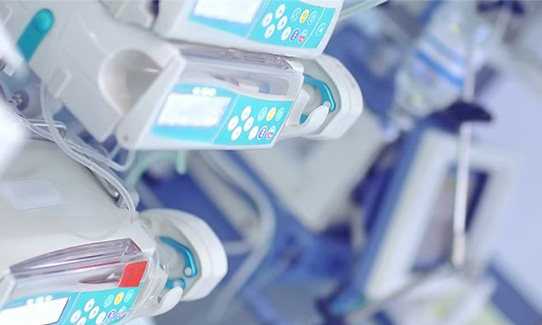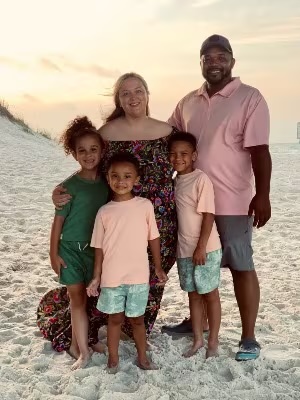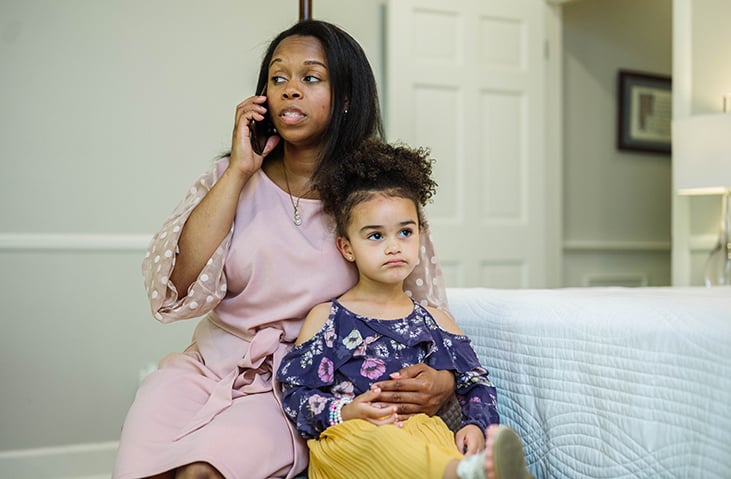

Jun 21 2022
‘These are God’s People’


Summary
Undray Love of Houlka recently had his final appointment with Dr. Joaquin Hidalgo after a four-wheeler accident literally turned his world on its head almost two years ago.

Undray Love of Houlka recently had his final appointment with Dr. Joaquin Hidalgo after a four-wheeler accident literally turned his world on its head almost two years ago.
The past two years have been tumultuous, marked by peaks and valleys during his recovery. “It was kind of sad,” says Undray’s wife, Chastity, of the June 6 appointment at North Mississippi Neurosurgical Services. “They have been there at every step.”
On Aug. 16, 2020, Undray had just finished working a six-day stretch at the Winchester Ammunition in Oxford. Undray’s mother came over to watch their three children so he and Chastity could ride four-wheelers nearby with friends. As evening came, Chastity asked Undray to run her home. “We were never separated—we always rode together,” she says. “But I just had a bad feeling that I couldn’t shake, and I wanted to go home.”
Chastity had only been home long enough to shower when she suddenly heard banging on their door. The news was devastating: Undray’s four-wheeler had caught the back tire of another four-wheeler and sent him hurling headfirst into a metal trash bin.
“He was unconscious,” Chastity says, “and he was not breathing.” Paramedics arrived and intubated Undray, then the CareFlight medical helicopter flew him to North Mississippi Medical Center’s Emergency Department in Tupelo. Chastity also rushed to the hospital, where she met Dr. Hidalgo.
“He used big words I’d never heard of. I tried to take them in, but my brain couldn’t process them,” she says. “I was given Undray’s wallet, wedding ring and necklace. It felt like goodbye.”
Dr. Hidalgo drilled a small hole in Undray’s skull—known as a burr hole procedure—to relieve pressure from the traumatic brain injury and inserted an intracranial pressure monitor. “All I wanted to hear from him was that he was going to fix Undray. He told me he couldn’t tell the outcome, but he would do everything he could—and I knew that he meant it,” Chastity says. “That wasn’t at all what I wanted to hear, but it was everything Undray needed—someone who would work night and day to bring him back to us. I was inconsolable. Dr. Hidalgo listened to my every tear-filled plea with more compassion than most see in a lifetime.”
Sedated and on a ventilator, Undray was admitted to the Critical Care Unit, and Chastity rarely left his side. “I wanted to be there while he literally fought for his life,” she says.
She soon met nurse practitioner Keshea Mims, who works alongside Dr. Hidalgo. “She spoke life into that room and was a constant advocate for Undray,” Chastity says. “Day or night, they were at his bedside working.”
In addition to his brain injury, Undray also battled breathing issues. His left lung collapsed, and he developed pneumonia and a bacterial infection. Doctors brought in a specialized bed to keep Undray in a prone position and help him heal. “It was a big scary bed,” Chastity says. “It was a last-ditch effort for him because his lungs were in such bad shape, and it worked.”
Gradually, doctors began to reduce the sedatives that had allowed Undray’s brain to rest and, hopefully, recover. “I was praying that he would wake up because I didn’t believe that was the end,” Chastity says. “All signs pointed to ‘this is really bad.’ The brain scans showed no brain activity, but I wasn’t willing to accept that.”
After 38 days in the CCU, Undray moved to a stepdown unit and then to a regular room. “On Day 42, I went down to the hospital’s Food Court to get lunch, and when I came back, Undray was rubbing his nose—purposeful movement!” Chastity said. “God knows when to show up and show out. Undray is a fighter, and he never gives up. I knew we were one step closer to moving to rehab.”
After 46 days in the hospital, he was transferred to a rehabilitation hospital in Jackson. He spent one month there before graduating to outpatient physical, occupational and speech therapy at NMMC’s Outpatient Rehabilitation Center in Tupelo. In November 2021, Undray underwent a second brain surgery.
One of Undray’s goals was to drive again, and with the help of his rehabilitation team, he reached that goal last fall. Undray now drives three days a week to AbilityWorks in Tupelo, a community program through the Mississippi Department of Rehabilitation Services that provides job training and work experience. “Undray wants to get back to work,” Chastity says. “He doesn’t want this to be his forever. He wants to do everything he can go get his life back.”
The Loves are slowly but surely embracing their new normal—and they are forever grateful to those who helped them get there.
“Our brains are amazing,” Chastity says. “Undray had to learn how to do everything again, and then he also had to remember how to do it. Unlike a broken leg or arm, doctors can’t repair the brain and they can’t replace it. There is no one answer. The only constant can be their care.”
And the Loves contend the miracle God performed and the care Undray received at NMMC made all the difference. “The people who were brought into our lives, these are special people,” Chastity says. “They saw him through near death. They cheered him on and genuinely wanted the best for our family. For almost two years, they have been a constant in our lives. A million ‘thank you’s would never be enough, but I will always sing their praises. These are God’s people.”
North Mississippi Neuroscience Institute can help. Call (662) 377-PAIN (7246) for more information or request an appointment.

Subscribe to Our Newsletter
Like this content and want to get more? Sign up for True North, the health and wellness newsletter from North Mississippi Health Services!

Subscribe to Our Newsletter
Like this content and want to get more? Sign up for True North, the health and wellness newsletter from North Mississippi Health Services!

Nurse Link®
Not sure if you need Urgent Care or the ER? Call 1-800-882-6274 anytime to speak directly to a registered nurse and get immediate answers. Using computerized medical protocols, nurses direct callers to the most appropriate treatment. Our nurses are available 24 hours per day, seven days per week.